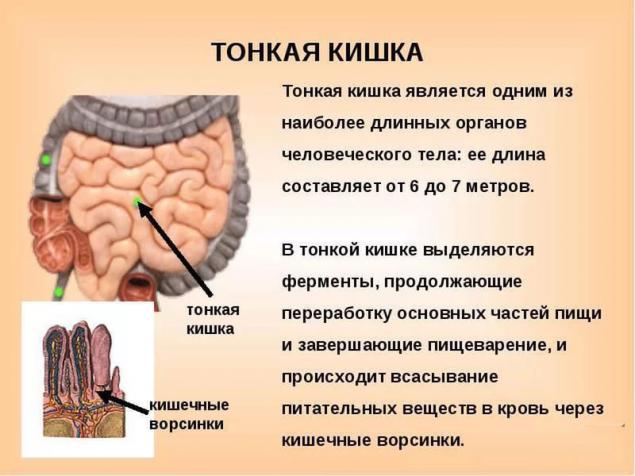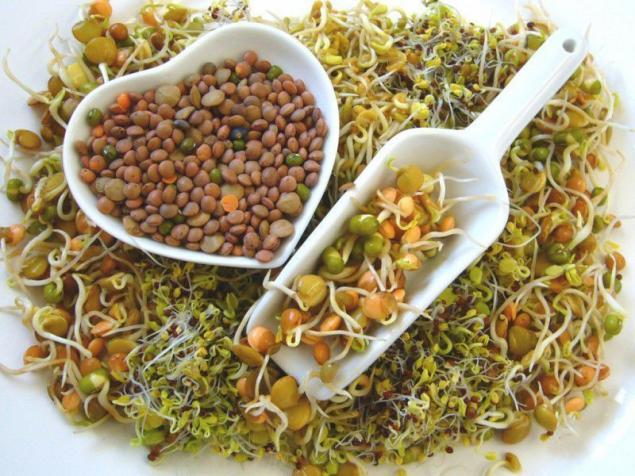Syndrome "current guts" is one of the reasons of hormonal imbalance
 Bashny.Net
Bashny.Net
Syndrome "the current bowel"
As you know, starts with a bath dressing room, and our health – good for the digestive system.
Today we will focus on the small intestine and how the state and the work of the intestine that affect our hormonal balance. Syndrome "current gut" or leaky gut syndrome (leaky gut) is a fast growing disease, which affects thousands of people, without even knowing it. As a rule, these people are experiencing not only digestive problems but also failures in the whole organism and, first of all, immune and hormonal systems.

The thickness of the wall of the small intestine is very small, the wall consists of only one row of cells, tightly adjacent to each other. On the structure of the wall of the small intestine resembles a network or a colander. The intestines can become more permeable or porous than normal due to damage of the intestinal mucosa. Abnormally large spaces between the cells lead to the entering the bloodstream from the intestines of toxic substances, bacteria and undigested food particles, all that is in the case of healthy bowel remains inside the intestine, processed and later excreted in the feces.
The presence in the blood of all that there should not be ( food particles, bacteria, etc.) triggers an inflammatory response throughout the body and can manifest as the following symptoms:
Various abnormalities in the digestive system
In addition, circulating blood partially undigested food particles trigger the immune system response and perceived by the body as a stressor. The adrenal glands begin to produce cortisol, which blocks work, especially progesterone, as both these hormone have the same metabolic pathway.The ratio of progesterone and estrogen is disrupted in the direction of oestrogen dominance, which causes a variety of hormonal balance.
One of the most important determinants of symptoms “syndrome ongoing gut ” (hereinafter STK) is increased sensitivity to various foods. It is necessary to consider a reaction to certain foods may be mild. It is not necessary that after eating certain foods you will instantly break out in a rash or begin to suffocate, but if left unattended, these "small" problems, in a short time can develop more serious diseases: arthritis, eczema, psoriasis, persistent hormonal imbalance, depression, headaches and muscle pain, constant fatigue syndrome, various autoimmune diseases (including diabetes mellitus and rheumatoid arthritis), may also disrupt the absorption in the blood of such important minerals and vitamins like zinc, iron, magnesium, and vitamin b 12.
What causes leaky gut syndrome?
1. Improper diet
Unfavorable for intestinal health is the use of the following products: neproroschennye cereals, sugar, genetically modified food and not organic dairy products, produced in a commercial environment with the use of antibiotics, hormones and pesticides.
Neproroschennye cereals contain large amounts of lectins and phytic acid.
Lectins are proteins and glycoproteins that bind carbohydrates on the cell surface, causing agglutination of these cells. They act as natural protection for plants and protect from mold and parasites. But this fact plays havoc with our bodies when we eat grains. Lectins cause agglutination of cells, accumulating in the form of mucus and clogging the wall of the small intestine, leading to inflammation and malfunction. Lectins are found not only in cereals but also in many other products. If you eat small amount of these products( wheat, rice, spelt, soy), then your body can handle it, but their regular consumption in large doses will contribute to the development of STK. Fermentation and germination of grains reduces the amount of lectins and phytic acid and makes the grains more easily digestible for the body. Destructive action on the wall of the small intestine also has gluten and genetically modified grains, as they contain more lectin.
Milk contains the protein A1 casein, which can also damage the intestinal mucosa. In the process of pasteurization of milk destroyed enzymes, causing the milk sugar (lactase) is difficult to digest. If you decide to drink milk, it is best to use unpasteurized and from animals grown in environmentally friendly conditions.
Sugar is another product that substantially interferes with the proper working of your digestive system. Remember that sugar is the favorite food for the fungus Candida and other harmful bacteria. Multiplying and releasing a lot of toxins, they cause inflammation in the small intestine wall that leads to its increased permeability.
2. Chronic stress
Chronic stress weakens the immune system and, in particular, local immunity in the lumen of the small intestine. Harmful bacteria and viruses that enter the gut with food, water and air, should not meet resistance from the immune system and begin to multiply, causing inflammation and lesions of the wall of the small intestine. Create a special program "Stress" for yourself: get plenty of rest, sleep, walk, exercise, listen to good music, meditate, practice yoga.
3. Toxins
Every day our body is exposed to thousands of toxins contained in the air (exhaust gases) in the water (chlorine), soil (pesticides), various drugs (antibiotics, synthetic hormones, drugs, etc.). Once in the body, they can trigger inflammation, including in the wall of the small intestine.
4. Dysbiosis
Dysbacteriosis is a condition in which the intestines there is an imbalance between beneficial and harmful bacteria (harmful use). Goiter is another cause of leaky gut syndrome. Every second person in modern society is suffering from intestinal dysbiosis, the reason for this is the excessive use of antibiotics; medical intervention, such as caesarean sections, when at birth the mother transmits to the child healthy flora; lack or insufficient amount of fresh vegetables and fermented food in the diet.

4 simple steps how to get rid of the syndrome “the current bowel”
Step 1: Avoid products that destroy the wall of the small intestine (sugar, gluten, genetically modified foods, meat and milk of animals grown in commercial terms);
Step 2: Include in your diet foods that help to restore the integrity of the intestinal wall;
Step 3: Use supplements that restore the wall of the small intestine;
Step 4: Restore the normal intestinal microflora with probiotics.
5 products, the use of which will help you to get rid of the syndrome “the current bowel”
If you suffer from STK, you just need to include in your diet the following 5 products:
6 supplements that will help to cure the syndrome, “current guts”
1.Probiotics (Probiotics) is the most important component of the fight against pathological bacteria and restore the normal microflora of the intestine. Regular consumption of fermented dairy products, fermented vegetables, and preparations of probiotics with the content of at least 50 million lactic acid bacteria and bifidobacteria will help to control the growth of pathogenic bacteria in the gut.
2.Digestive enzymes (Digestive enzymes) to(1-2 capsules before each meal) improves the digestion process, reducing the likelihood of partially digested particles of food through a damaged intestinal wall into the blood stream.
3.Glutamine (L–glutamine) is an amino acid that is necessary for recovery of the cells lining the walls of the small intestine. In addition to restoring glutamine performs a protective function, preventing the stimuli (medicines, toxins) to destroy the cells. The drug is sold in powder form. Take 2-5 grams 2 times a day .
4.Licorice root (Licorice root) which balances the level of cortisol (stress hormone) and the level of hydrochloric acid in the stomach. Licorice stimulates the natural repair process of the intestinal mucosa and stomach. Take 500 mg 2 times a day, especially if you are in a state of chronic stress.

5.Quercetin (Quercetin) flavonol found in many fruits and vegetables, is also a Supplement that stimulates protein synthesis. Quercetin helps to preserve the integrity of the intestinal mucosa. In addition, quercetin reduces the amount of histamine, which is actively secreted in allergic reactions and food sensitivity. Take 500 mg 3 times a day with food.
6.The juice of aloe (Aloe Vera). Substances contained in this plant inhibit the growth of fungus Candida in the intestines, stimulate the growth of beneficial microflora, thereby relieving symptoms of inflammatory processes contribute to epitelizatia and restoration of function of the mucosa. Aloe Vera juice, take 1 -2 times daily 30-50 ml of fasting.
If you follow the above recommendations, it will help you to improve and restore the small intestine and, consequently, to normalize digestion and the immune and endocrine systems. published
Author: Ksenia Trushlyakov
P. S. And remember, just changing your mind — together we change the world! ©
Source: hormonetika.com/sindrom-tekuchey-kichki-h/
As you know, starts with a bath dressing room, and our health – good for the digestive system.
Today we will focus on the small intestine and how the state and the work of the intestine that affect our hormonal balance. Syndrome "current gut" or leaky gut syndrome (leaky gut) is a fast growing disease, which affects thousands of people, without even knowing it. As a rule, these people are experiencing not only digestive problems but also failures in the whole organism and, first of all, immune and hormonal systems.

The thickness of the wall of the small intestine is very small, the wall consists of only one row of cells, tightly adjacent to each other. On the structure of the wall of the small intestine resembles a network or a colander. The intestines can become more permeable or porous than normal due to damage of the intestinal mucosa. Abnormally large spaces between the cells lead to the entering the bloodstream from the intestines of toxic substances, bacteria and undigested food particles, all that is in the case of healthy bowel remains inside the intestine, processed and later excreted in the feces.
The presence in the blood of all that there should not be ( food particles, bacteria, etc.) triggers an inflammatory response throughout the body and can manifest as the following symptoms:
- Flatulence
- Sensitivity to different foods
- Fatigue
- Joint pain
- Headaches
- Various rashes on the skin of the face and body
- Weight
- Frequent colds
- Different disruption to the hormonal system (thyroid gland, estrogen dominance, progesterona failure, menstrual disorders, PMS, endometriosis)
Various abnormalities in the digestive system
In addition, circulating blood partially undigested food particles trigger the immune system response and perceived by the body as a stressor. The adrenal glands begin to produce cortisol, which blocks work, especially progesterone, as both these hormone have the same metabolic pathway.The ratio of progesterone and estrogen is disrupted in the direction of oestrogen dominance, which causes a variety of hormonal balance.
One of the most important determinants of symptoms “syndrome ongoing gut ” (hereinafter STK) is increased sensitivity to various foods. It is necessary to consider a reaction to certain foods may be mild. It is not necessary that after eating certain foods you will instantly break out in a rash or begin to suffocate, but if left unattended, these "small" problems, in a short time can develop more serious diseases: arthritis, eczema, psoriasis, persistent hormonal imbalance, depression, headaches and muscle pain, constant fatigue syndrome, various autoimmune diseases (including diabetes mellitus and rheumatoid arthritis), may also disrupt the absorption in the blood of such important minerals and vitamins like zinc, iron, magnesium, and vitamin b 12.
What causes leaky gut syndrome?
1. Improper diet
Unfavorable for intestinal health is the use of the following products: neproroschennye cereals, sugar, genetically modified food and not organic dairy products, produced in a commercial environment with the use of antibiotics, hormones and pesticides.
Neproroschennye cereals contain large amounts of lectins and phytic acid.
Lectins are proteins and glycoproteins that bind carbohydrates on the cell surface, causing agglutination of these cells. They act as natural protection for plants and protect from mold and parasites. But this fact plays havoc with our bodies when we eat grains. Lectins cause agglutination of cells, accumulating in the form of mucus and clogging the wall of the small intestine, leading to inflammation and malfunction. Lectins are found not only in cereals but also in many other products. If you eat small amount of these products( wheat, rice, spelt, soy), then your body can handle it, but their regular consumption in large doses will contribute to the development of STK. Fermentation and germination of grains reduces the amount of lectins and phytic acid and makes the grains more easily digestible for the body. Destructive action on the wall of the small intestine also has gluten and genetically modified grains, as they contain more lectin.
Milk contains the protein A1 casein, which can also damage the intestinal mucosa. In the process of pasteurization of milk destroyed enzymes, causing the milk sugar (lactase) is difficult to digest. If you decide to drink milk, it is best to use unpasteurized and from animals grown in environmentally friendly conditions.
Sugar is another product that substantially interferes with the proper working of your digestive system. Remember that sugar is the favorite food for the fungus Candida and other harmful bacteria. Multiplying and releasing a lot of toxins, they cause inflammation in the small intestine wall that leads to its increased permeability.
2. Chronic stress
Chronic stress weakens the immune system and, in particular, local immunity in the lumen of the small intestine. Harmful bacteria and viruses that enter the gut with food, water and air, should not meet resistance from the immune system and begin to multiply, causing inflammation and lesions of the wall of the small intestine. Create a special program "Stress" for yourself: get plenty of rest, sleep, walk, exercise, listen to good music, meditate, practice yoga.
3. Toxins
Every day our body is exposed to thousands of toxins contained in the air (exhaust gases) in the water (chlorine), soil (pesticides), various drugs (antibiotics, synthetic hormones, drugs, etc.). Once in the body, they can trigger inflammation, including in the wall of the small intestine.
4. Dysbiosis
Dysbacteriosis is a condition in which the intestines there is an imbalance between beneficial and harmful bacteria (harmful use). Goiter is another cause of leaky gut syndrome. Every second person in modern society is suffering from intestinal dysbiosis, the reason for this is the excessive use of antibiotics; medical intervention, such as caesarean sections, when at birth the mother transmits to the child healthy flora; lack or insufficient amount of fresh vegetables and fermented food in the diet.

4 simple steps how to get rid of the syndrome “the current bowel”
Step 1: Avoid products that destroy the wall of the small intestine (sugar, gluten, genetically modified foods, meat and milk of animals grown in commercial terms);
Step 2: Include in your diet foods that help to restore the integrity of the intestinal wall;
Step 3: Use supplements that restore the wall of the small intestine;
Step 4: Restore the normal intestinal microflora with probiotics.
5 products, the use of which will help you to get rid of the syndrome “the current bowel”
If you suffer from STK, you just need to include in your diet the following 5 products:
- Broth made from bones (bone broth, cook for 12-24 hours) is rich in collagen, amino acids that help to restore the integrity of the wall of the small intestine. In some cases, a 3 - day fasting this broth helps to get rid of many autoimmune diseases and cure of STK.
- Fermented foods (preferably homemade)
- Fermented vegetables ( such as salted cabbage) contain organic acids and beneficial bacteria for normalizing the intestinal flora.
- Coconut and products made from it is very useful to restore the walls of the small intestine, as they contain fatty acids of medium length. Such acids are easy to digest and have anti-inflammatory effect. At home you can prepare yogurt based on coconut milk that is also rich in beneficial bacteria.
- Sprouted grains are a great source of easily digestible fiber. In addition, they stimulate the growth of beneficial bacteria in the gut.
6 supplements that will help to cure the syndrome, “current guts”
1.Probiotics (Probiotics) is the most important component of the fight against pathological bacteria and restore the normal microflora of the intestine. Regular consumption of fermented dairy products, fermented vegetables, and preparations of probiotics with the content of at least 50 million lactic acid bacteria and bifidobacteria will help to control the growth of pathogenic bacteria in the gut.
2.Digestive enzymes (Digestive enzymes) to(1-2 capsules before each meal) improves the digestion process, reducing the likelihood of partially digested particles of food through a damaged intestinal wall into the blood stream.
3.Glutamine (L–glutamine) is an amino acid that is necessary for recovery of the cells lining the walls of the small intestine. In addition to restoring glutamine performs a protective function, preventing the stimuli (medicines, toxins) to destroy the cells. The drug is sold in powder form. Take 2-5 grams 2 times a day .
4.Licorice root (Licorice root) which balances the level of cortisol (stress hormone) and the level of hydrochloric acid in the stomach. Licorice stimulates the natural repair process of the intestinal mucosa and stomach. Take 500 mg 2 times a day, especially if you are in a state of chronic stress.

5.Quercetin (Quercetin) flavonol found in many fruits and vegetables, is also a Supplement that stimulates protein synthesis. Quercetin helps to preserve the integrity of the intestinal mucosa. In addition, quercetin reduces the amount of histamine, which is actively secreted in allergic reactions and food sensitivity. Take 500 mg 3 times a day with food.
6.The juice of aloe (Aloe Vera). Substances contained in this plant inhibit the growth of fungus Candida in the intestines, stimulate the growth of beneficial microflora, thereby relieving symptoms of inflammatory processes contribute to epitelizatia and restoration of function of the mucosa. Aloe Vera juice, take 1 -2 times daily 30-50 ml of fasting.
If you follow the above recommendations, it will help you to improve and restore the small intestine and, consequently, to normalize digestion and the immune and endocrine systems. published
Author: Ksenia Trushlyakov
P. S. And remember, just changing your mind — together we change the world! ©
Source: hormonetika.com/sindrom-tekuchey-kichki-h/
Tags
See also
Causes Of Irritable Bowel Syndrome
Simple rules for a good functioning of the intestines.
Douglas Graham. Diet 80 Oct. 10 Audiobook.
Importantly! The destructive work of gluten in our body
Caesarean section and autism, the relationship of gut and brain
The one and only cause of Your constant fatigue
Folk remedies restore the hormonal balance
The advantages of vegetarianism for hormonal balance
Magnesium reduces the risk of diabetes and heart disease

















